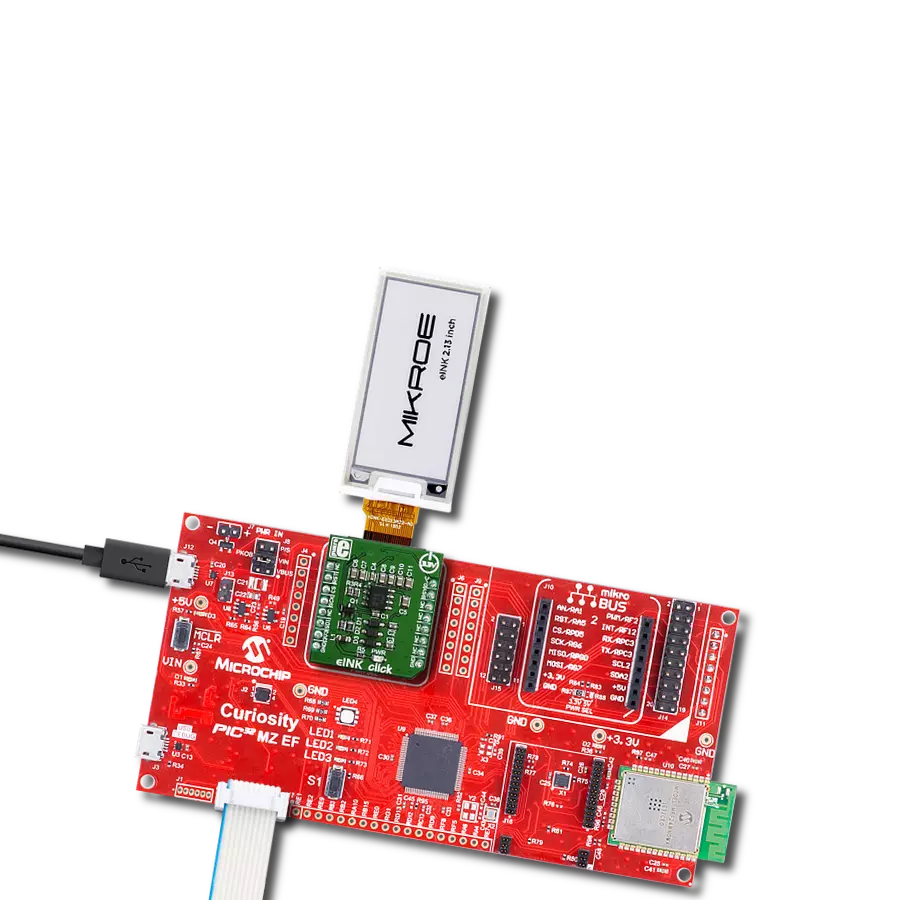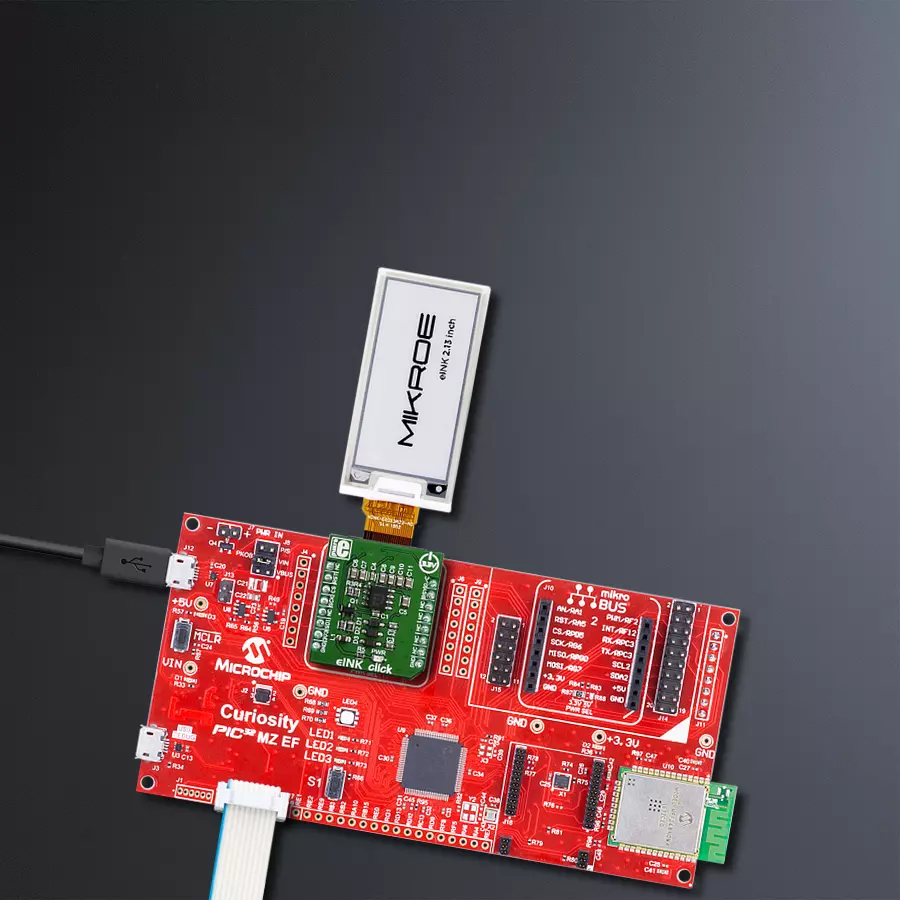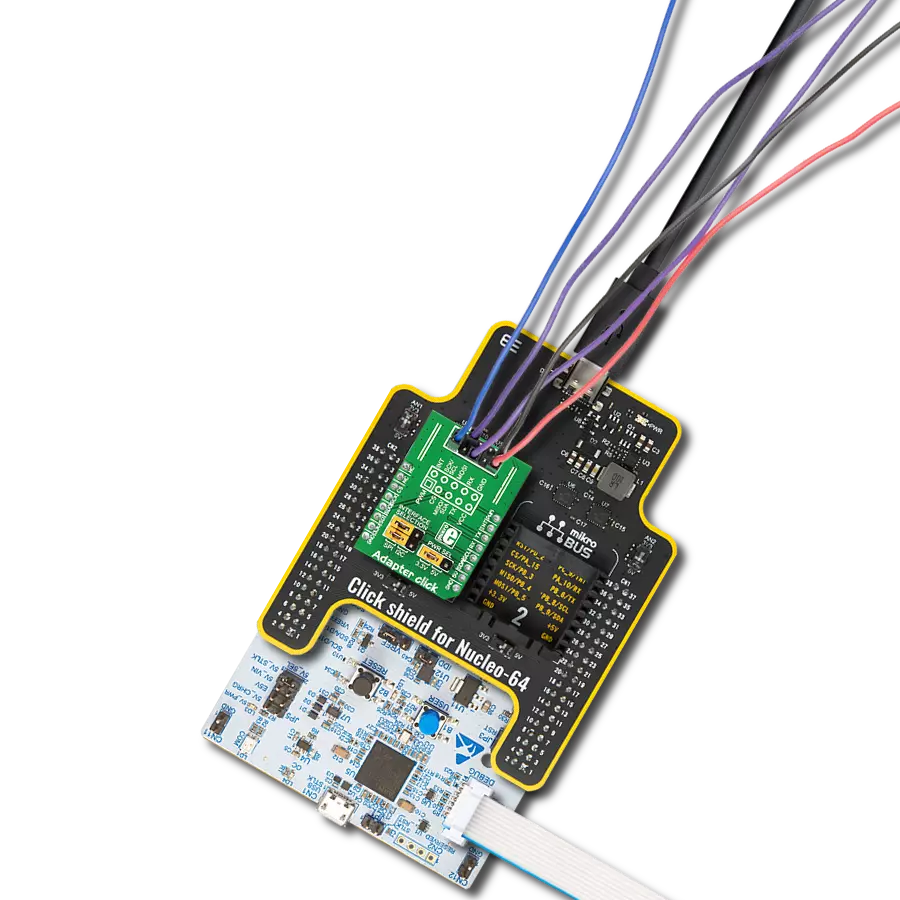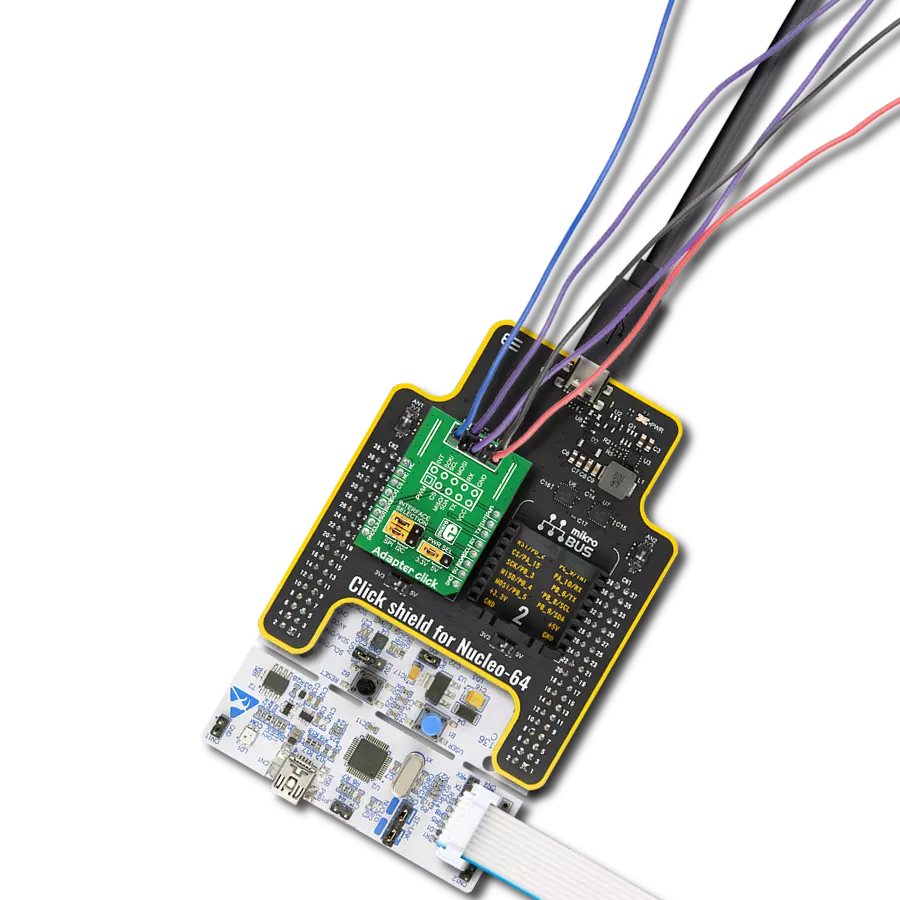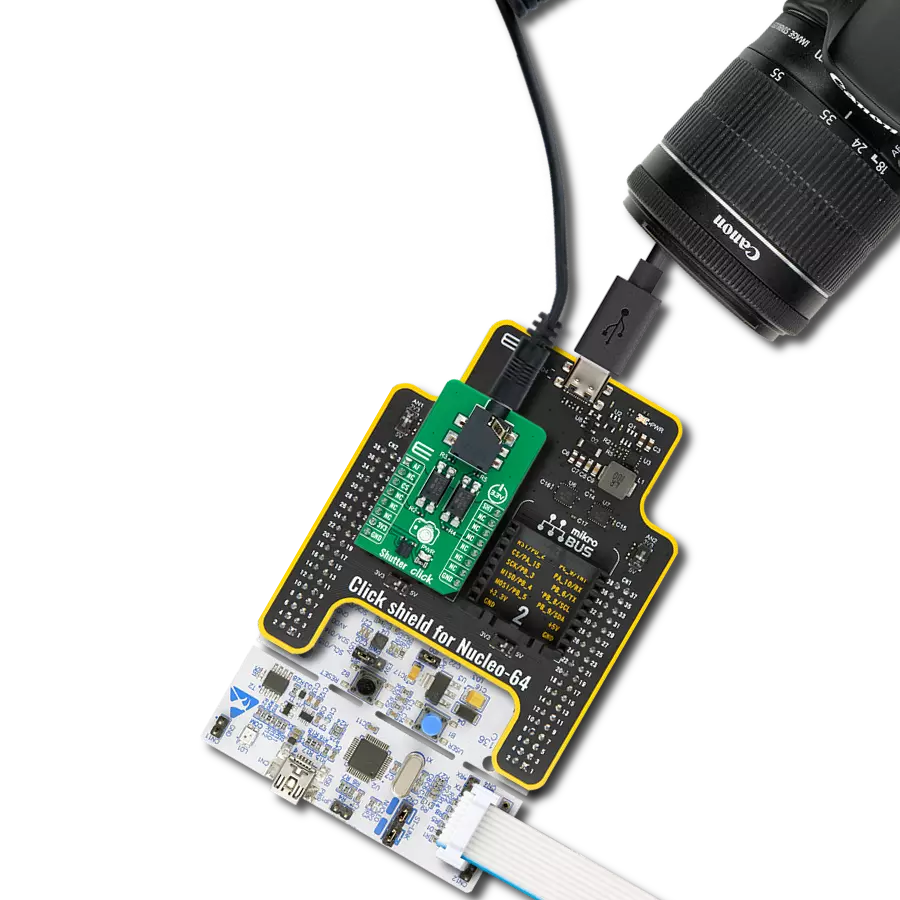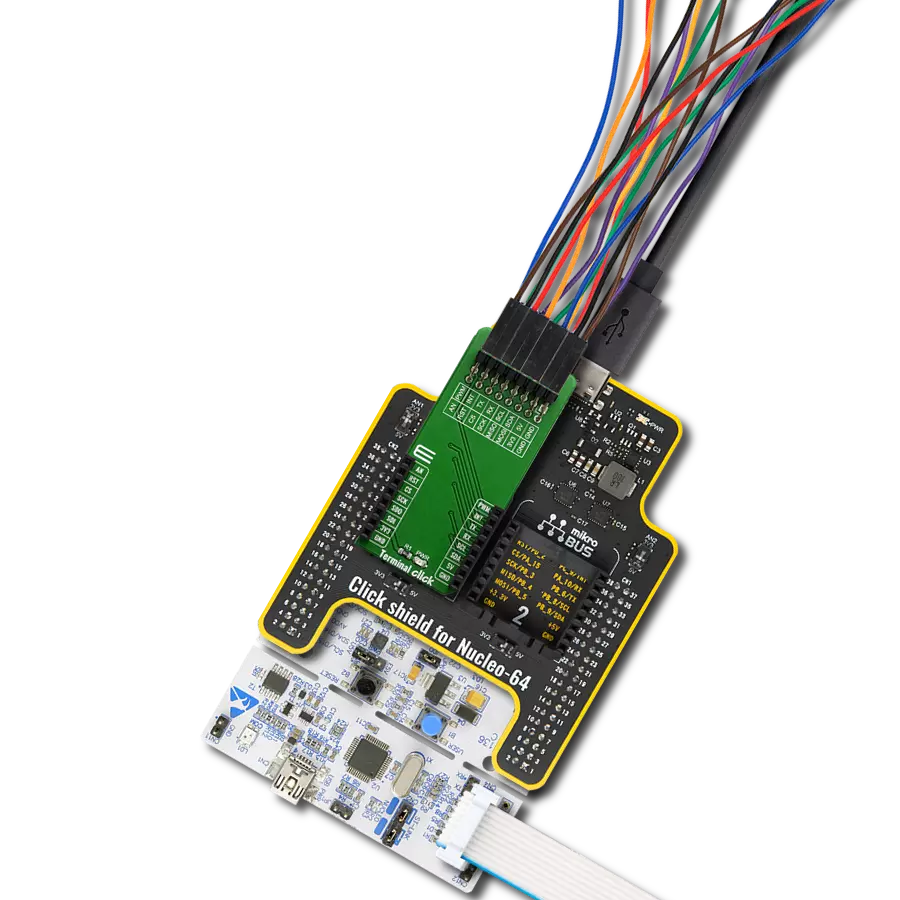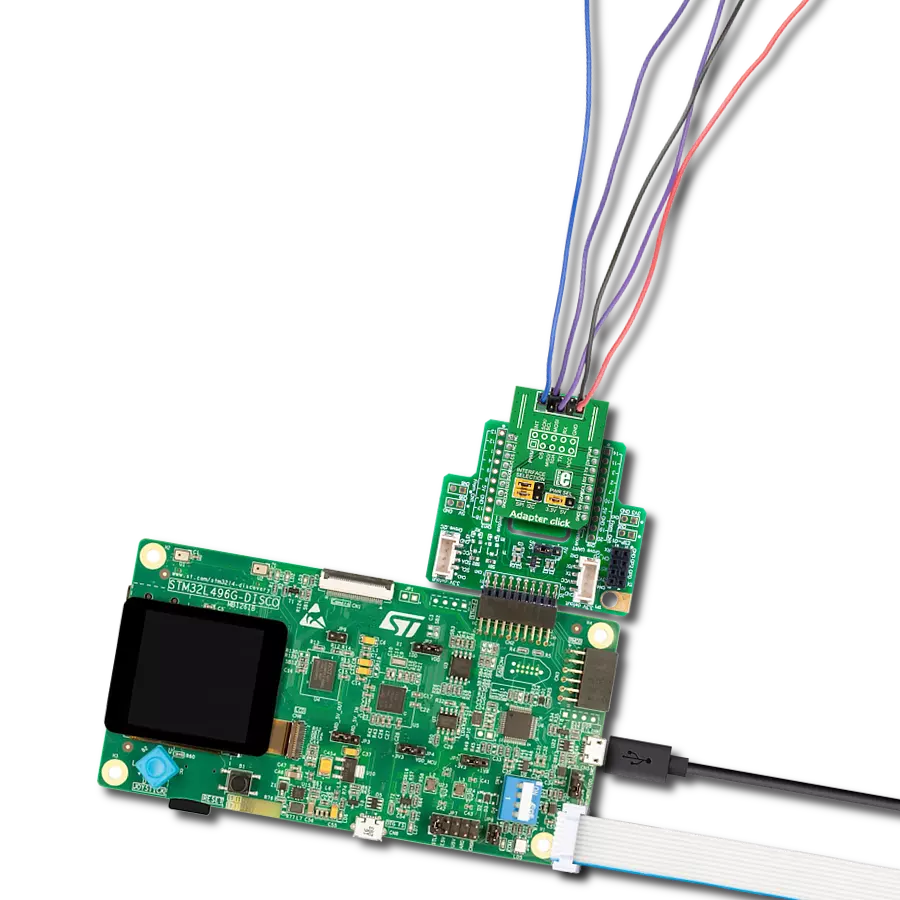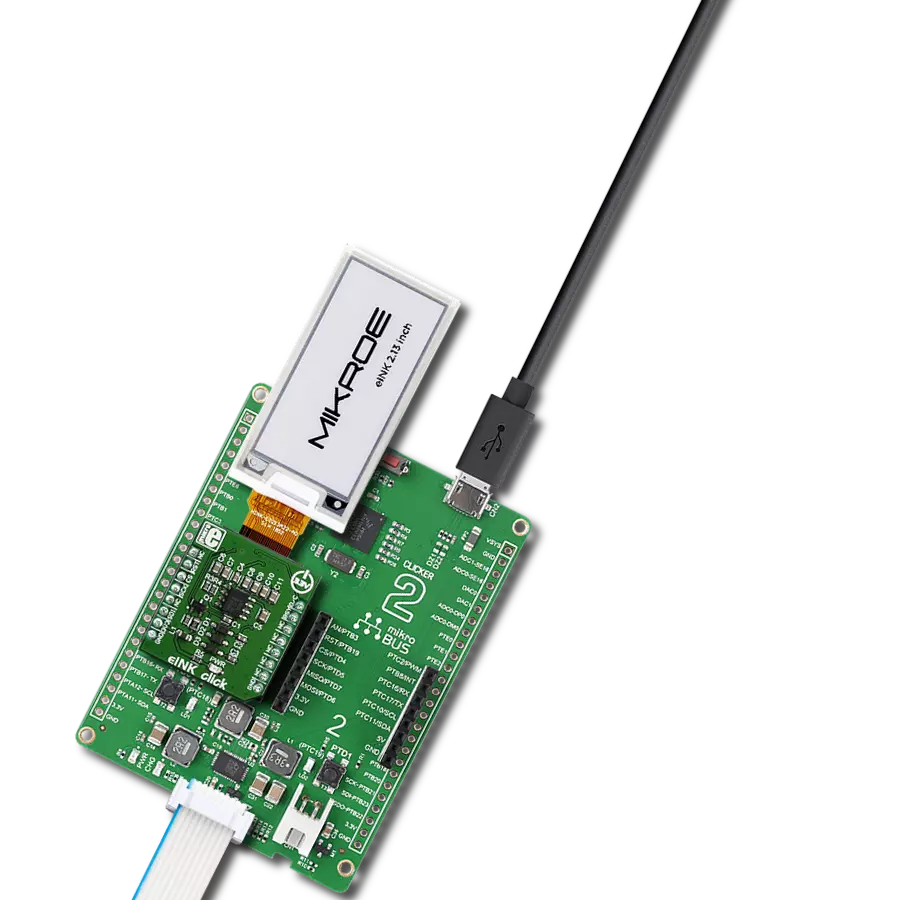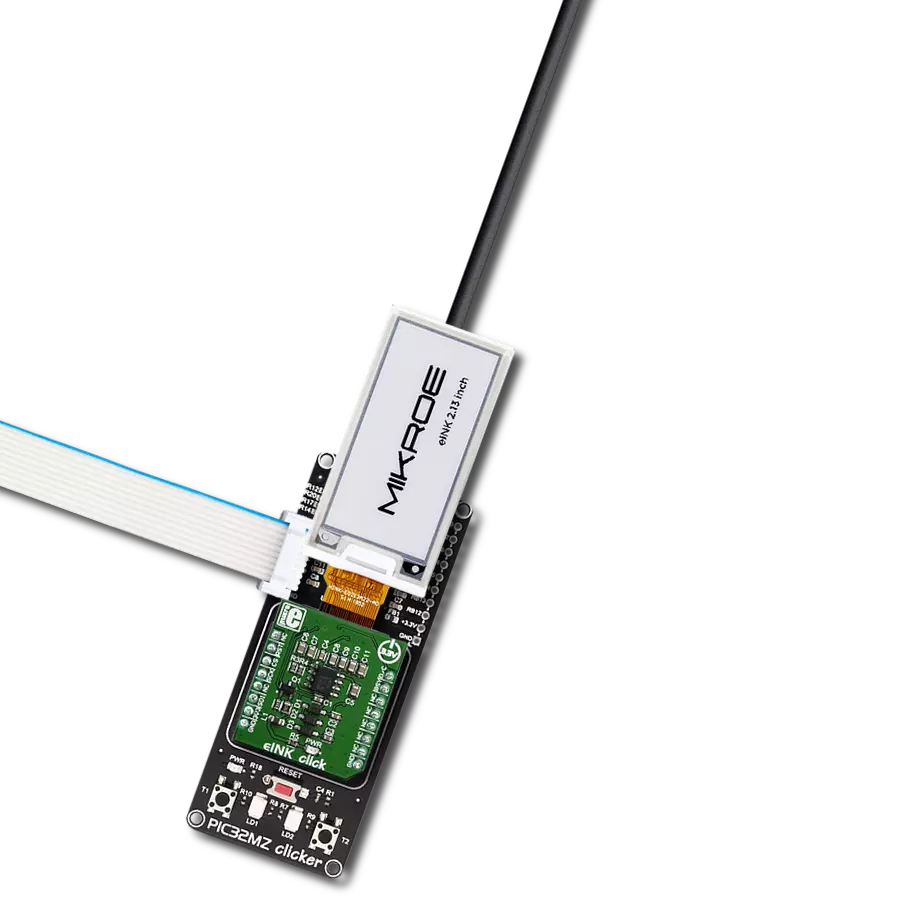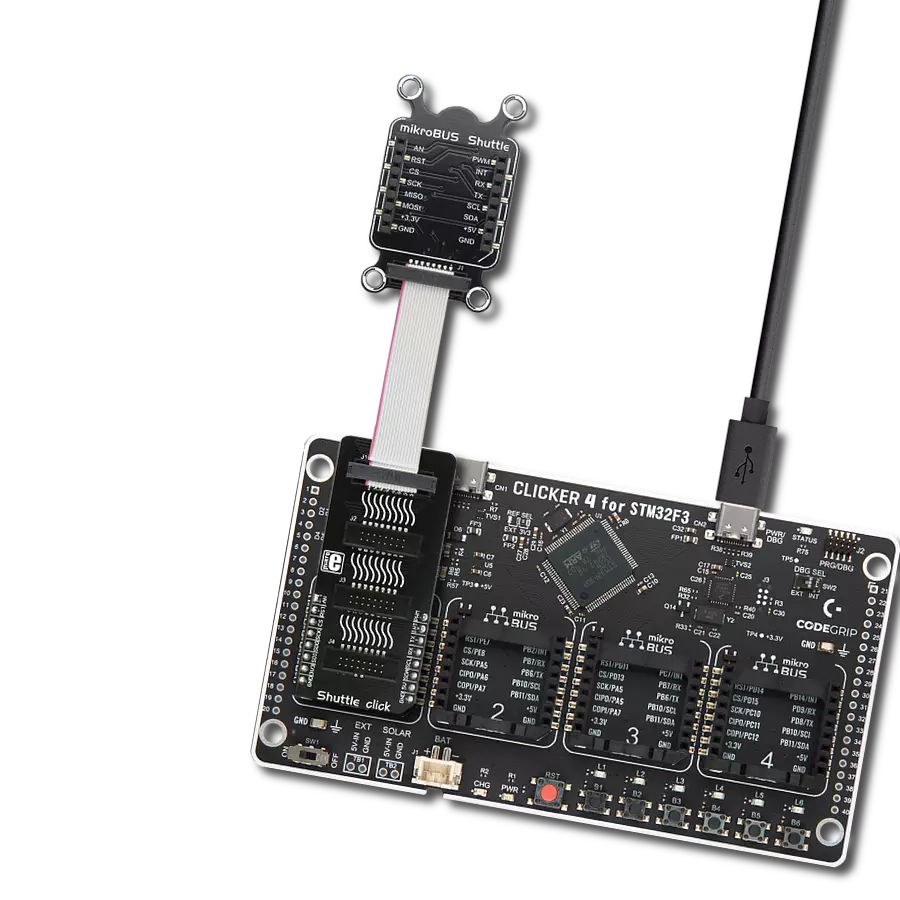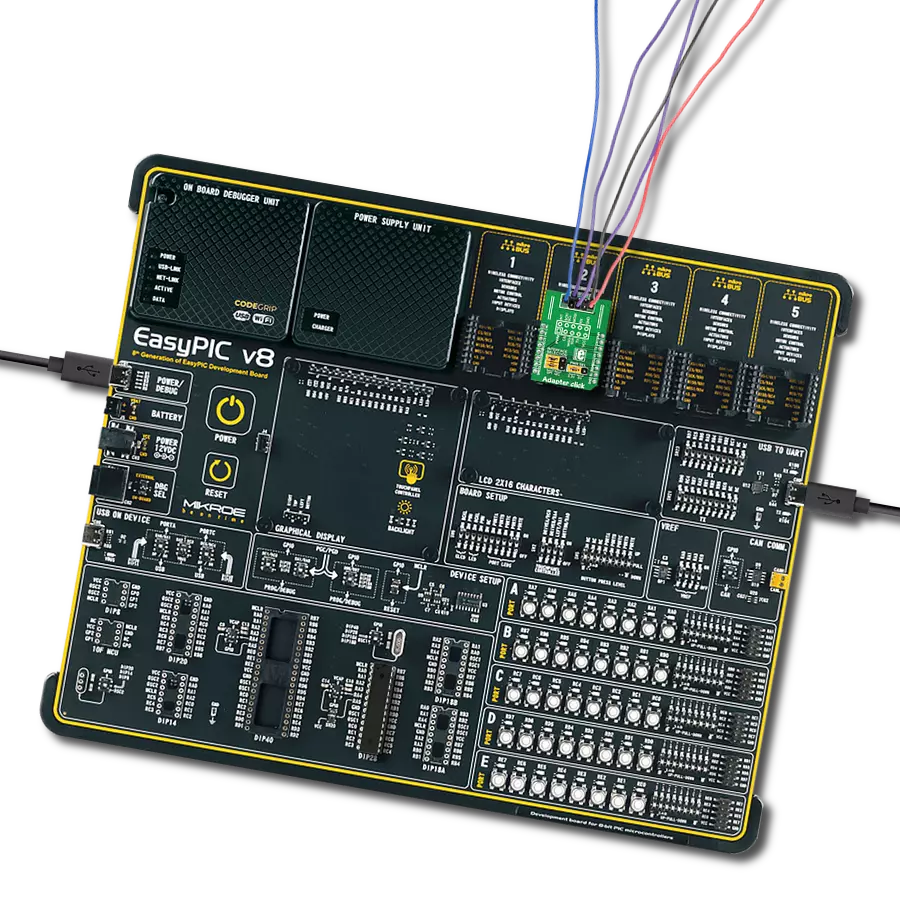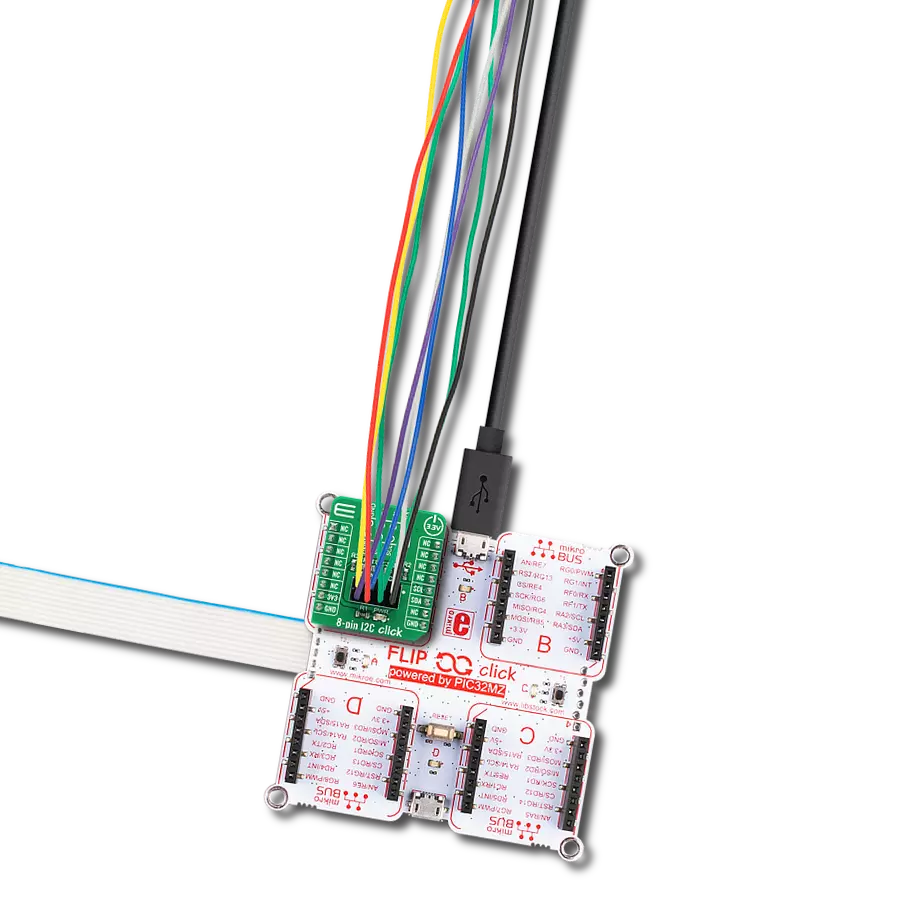我们的适配器解决方案在MCU和电子墨水显示屏之间建立了完美的共生关系,实现了流畅、直观的控制,开启了无限可能的世界。
A
A
硬件概览
它是如何工作的?
eINK Click是一个适配器Click board™,用于将兼容的eINK显示屏与主控MCU连接。eINK显示屏最显著的特点是其极低的功耗和断电后仍能保留信息的能力。只有在显示内容变化时才会消耗电力。该Click board™随附的是172x72 eINK显示屏,由集成的SSD1606控制器驱动,可以显示4种灰度:黑色、深灰色、浅灰色和白色。同类型的显示屏也被用于流行的Kindle电子阅读器上。eINK是一种相当新的技术,具有光明的前景。暴露在直射阳光下时,显示内容不会降解,实际上显示屏的行为就像真正的纸张;当有更多光线照射到其表面时,显示效果更好。eINK可以应用于各种领域:它可以用于需要显示输出的极低功耗应用,如手机和可穿戴设备、工业和包装应用、电子阅读和写
作、电子货架标签等。eINK显示屏的工作原理相当简单:黑色和白色颜料被困在微胶囊中,在两个电极之间的清晰液体中分散。白色颜料带正电荷,而黑色颜料带负电荷。当电极之间形成电磁场时,颜料根据电场的方向被排斥或吸引到电极上,这导致明亮或暗色的颜料被定位在微胶囊的底部或顶部表面。当黑色颜料定位在微胶囊的顶部表面时,它被观察为黑色像素,反之亦然。还可以将颜料电荷定位,使每种颜色占据微胶囊顶部表面的一半,这就是产生灰度的方法。与eINK Click配套的显示屏是EA-EPA20-A,一款2英寸、172x72像素的电子墨水显示屏,集成了SSD1606驱动器/控制器,来自Electronic Assembly。该显示屏使用SPI通信协议与主控MCU通信。该显示屏具有固有
的宽视角和高对比度,以及在日光条件下良好的可读性。Click board™本身携带了支持电子元件,用于为EPA20-A显示器的正常运行提供所有必要的电压。SSD1606引脚通过显示器的平板电缆传递,并通过Click board上的24引脚、0.5mm ZIF连接器连接。从那里,命令和数据线被路由到eINK click的mikroBUS™上的适当引脚。eINK click还包含LM75热传感器,该传感器使用I2C协议与SSD1606驱动IC通信。这对于显示屏的热补偿是必需的,以便它可以在广泛的温度范围内工作,从0°C到+50°C。这个设备的总功耗非常低。只有在需要重新排列微胞颜料时才需要电力,而维持显示内容不需要电力。即使断电,显示屏也会保留内容。Click board和显示屏通过mikroBUS™的3.3V电源供电。
功能概述
开发板
Curiosity PIC32 MZ EF 开发板是一个完全集成的 32 位开发平台,特点是高性能的 PIC32MZ EF 系列(PIC32MZ2048EFM),该系列具有 2MB Flash、512KB RAM、集成的浮点单元(FPU)、加密加速器和出色的连接选项。它包括一个集成的程序员和调试器,无需额外硬件。用户可以通过 MIKROE
mikroBUS™ Click™ 适配器板扩展功能,通过 Microchip PHY 女儿板添加以太网连接功能,使用 Microchip 扩展板添加 WiFi 连接能力,并通过 Microchip 音频女儿板添加音频输入和输出功能。这些板完全集成到 PIC32 强大的软件框架 MPLAB Harmony 中,该框架提供了一个灵活且模块化的接口
来应用开发、一套丰富的互操作软件堆栈(TCP-IP、USB)和易于使用的功能。Curiosity PIC32 MZ EF 开发板提供了扩展能力,使其成为连接性、物联网和通用应用中快速原型设计的绝佳选择。
微控制器概述
MCU卡片 / MCU
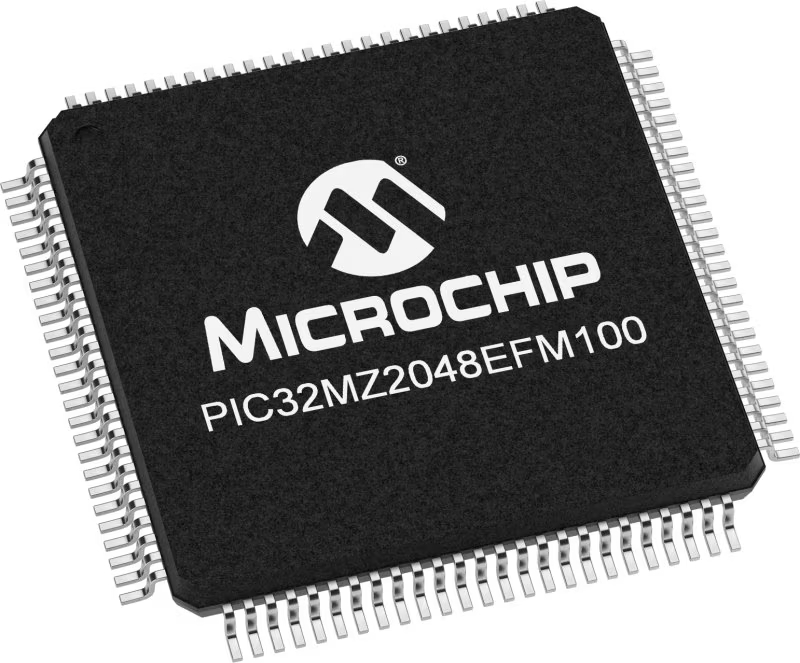
建筑
PIC32
MCU 内存 (KB)
2048
硅供应商
Microchip
引脚数
100
RAM (字节)
524288
你完善了我!
配件
使用的MCU引脚
mikroBUS™映射器
“仔细看看!”
Click board™ 原理图
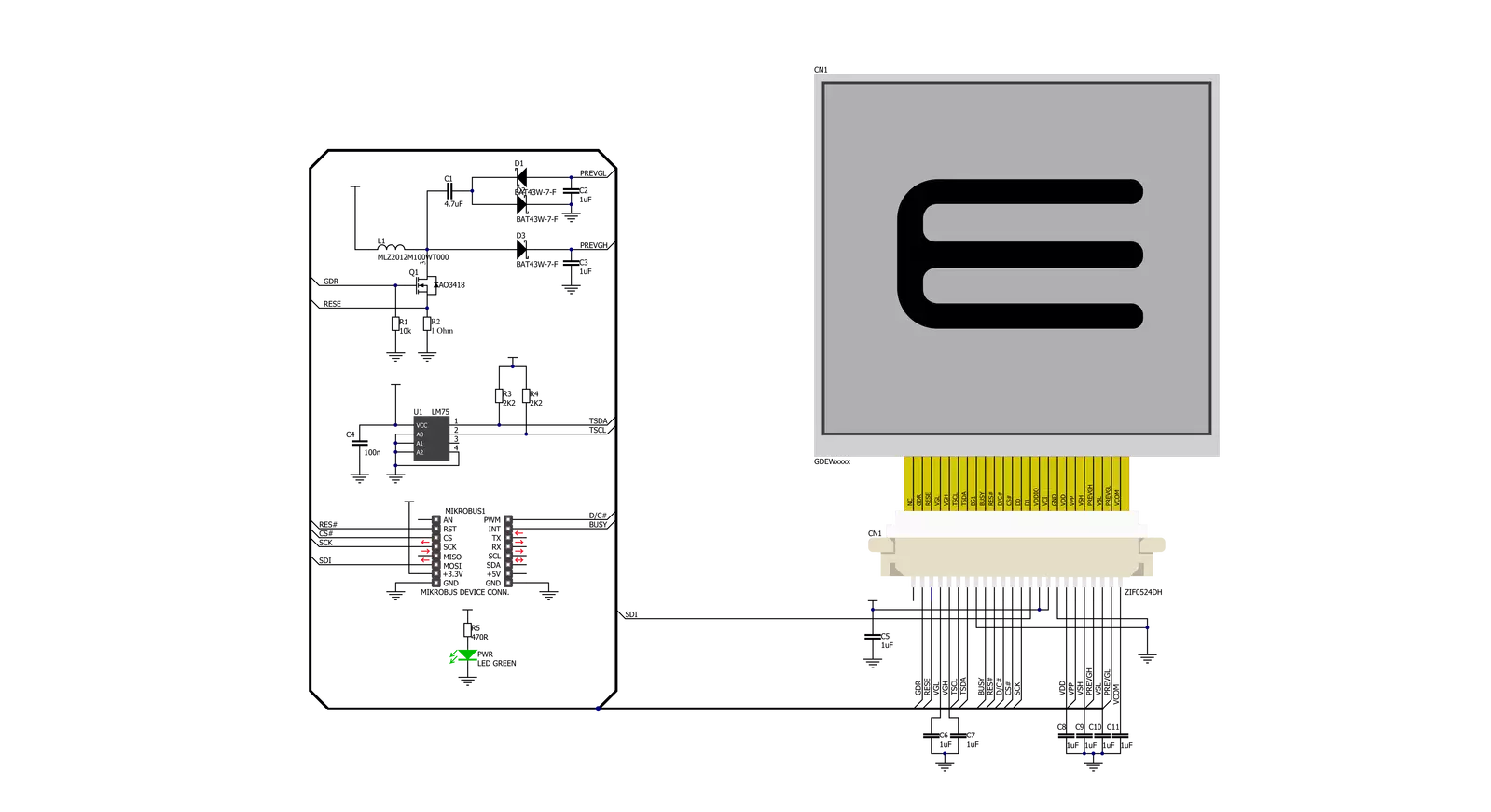
一步一步来
项目组装
软件支持
库描述
这个库包含了 eINK Click 驱动程序的 API。
关键函数:
eink200_set_lut- 设置LUT表eink200_display_image- 显示图像eink200_set_font- 设置文本字体
开源
代码示例
完整的应用程序代码和一个现成的项目可以通过NECTO Studio包管理器直接安装到NECTO Studio。 应用程序代码也可以在MIKROE的GitHub账户中找到。
/*!
* \file
* \brief Eink Click example
*
* # Description
* This application demonstrates the use of eINK Click board.
*
* The demo application is composed of two sections :
*
* ## Application Init
* Initializes the driver and configures the Click board for 2.00 inch eINK display.
* After that, if the TEXT mode is supported, shows a desired text messages on the display.
*
* ## Application Task
* Draws two demo images to the display with a one-second delay between each drawing.
*
* @note
* Due to insuficient RAM memory, only the IMAGE mode is supported with 8-bit PIC microcontrollers.
*
* Here is the procedure for creating an Image or Font arrays:
*
* - Create Image:
* Save the image in resolution of 172x72 px with the extension (jpg) ...
* Upload the image to Image2Lcd program
* Set parameters to:
* 1. Output file type : C array
* 2. Scan Mode : Vertical scan
* 3. Bits Pixel : 4 Color
* 4. Max Width and Height : 172x72
* 5. Select only MSB first checkmark
* 6. Check Reverse color and adjust Normal type
* The image to be generated should contain exact 3096 bytes ...
* Insert the image into the file eink_display_image.h
*
* - Create Font:
* Create a new VisualTFT project
* Add label and adjust text font
* Generate source code
* Copy the font array from resource.c file and paste it to eink200inch_font.h file
*
* *** Changing the LUT table can lead to loss of display performance ....
*
* \author MikroE Team
*
*/
// ------------------------------------------------------------------- INCLUDES
#include "board.h"
#include "log.h"
#include "eink.h"
#include "eink200inch_image.h"
#ifndef IMAGE_MODE_ONLY
#include "eink200inch_font.h"
#endif
// ------------------------------------------------------------------ VARIABLES
static eink_t eink;
const uint8_t eink_lut_table[ 90 ] =
{
0x82, 0x00, 0x00, 0x00, 0xAA, 0x00, 0x00, 0x00,
0xAA, 0xAA, 0x00, 0x00, 0xAA, 0xAA, 0xAA, 0x00,
0x55, 0xAA, 0xAA, 0x00, 0x55, 0x55, 0x55, 0x55,
0xAA, 0xAA, 0xAA, 0xAA, 0x55, 0x55, 0x55, 0x55,
0xAA, 0xAA, 0xAA, 0xAA, 0x15, 0x15, 0x15, 0x15,
0x05, 0x05, 0x05, 0x05, 0x01, 0x01, 0x01, 0x01,
0x00, 0x00, 0x00, 0x00, 0x00, 0x00, 0x00, 0x00,
0x00, 0x00, 0x00, 0x00, 0x00, 0x00, 0x00, 0x00,
0x00, 0x00, 0x00, 0x00, 0x00, 0x00, 0x00, 0x00,
0x00, 0x00, 0x00, 0x00, 0x00, 0x00, 0x00, 0x00,
0x41, 0x45, 0xF1, 0xFF, 0x5F, 0x55, 0x01, 0x00,
0x00, 0x00
};
uint8_t demo_text[ 5 ] = { 'e', 'I', 'N', 'K' , 0 };
uint8_t demo_text1[ 8 ] = { 'D', 'i', 's', 'p', 'l', 'a', 'y', 0 };
uint8_t demo_text2[ 10 ] = { '2', '.', '0', '0', 'i', 'n', 'c', 'h', 0 };
// ------------------------------------------------------ APPLICATION FUNCTIONS
void application_init ( void )
{
eink_cfg_t cfg;
eink200inch_font_t cfg_font;
eink_text_set_t text_set;
// Click initialization.
eink_cfg_setup( &cfg );
EINK_MAP_MIKROBUS( cfg, MIKROBUS_1 );
eink_init( &eink, &cfg );
eink_start_config( &eink );
eink_set_lut( &eink, eink_lut_table, 90 );
Delay_ms ( 1000 );
#ifndef IMAGE_MODE_ONLY
cfg_font.p_font = &guiFont_Tahoma_10_Regular[ 0 ];
cfg_font.color = EINK_SCREEN_COLOR_WHITE;
cfg_font.orientation = EINK_FO_HORIZONTAL;
eink_set_font( &eink, &cfg_font );
text_set.n_char = 4;
text_set.text_x = 10;
text_set.text_y = 50;
eink_text( &eink, &demo_text[ 0 ], &text_set );
text_set.n_char = 7;
text_set.text_x = 10;
text_set.text_y = 90;
eink_text( &eink, &demo_text1[ 0 ], &text_set );
text_set.n_char = 8;
text_set.text_x = 10;
text_set.text_y = 130;
eink_text( &eink, &demo_text2[ 0 ], &text_set );
Delay_ms ( 1000 );
Delay_ms ( 1000 );
Delay_ms ( 1000 );
Delay_ms ( 1000 );
Delay_ms ( 1000 );
#endif
}
void application_task ( void )
{
eink_display_image ( &eink, demo_image_black );
Delay_1sec( );
eink_display_image ( &eink, demo_image_white );
Delay_1sec( );
}
int main ( void )
{
/* Do not remove this line or clock might not be set correctly. */
#ifdef PREINIT_SUPPORTED
preinit();
#endif
application_init( );
for ( ; ; )
{
application_task( );
}
return 0;
}
// ------------------------------------------------------------------------ END
额外支持
资源
类别:适配器
